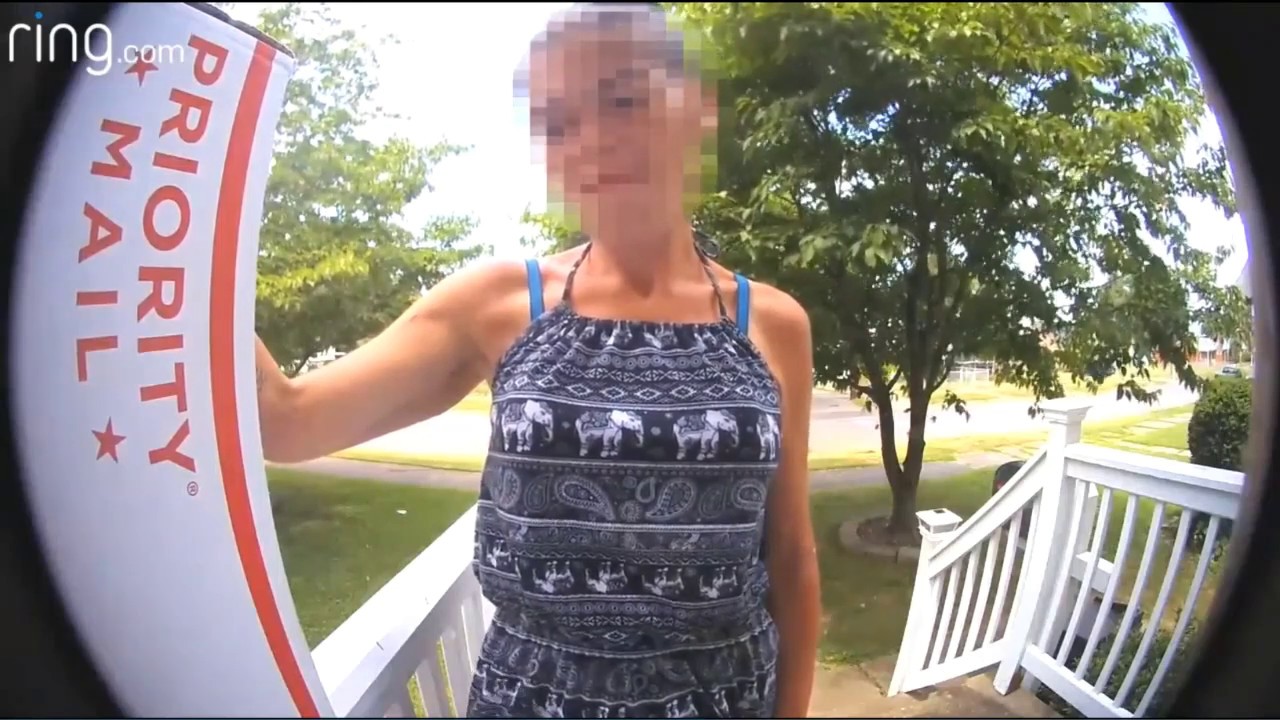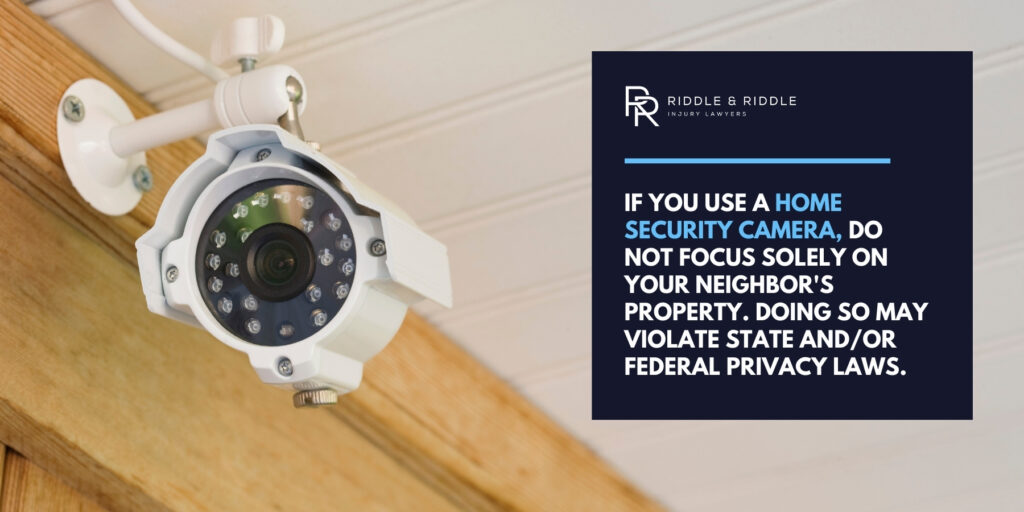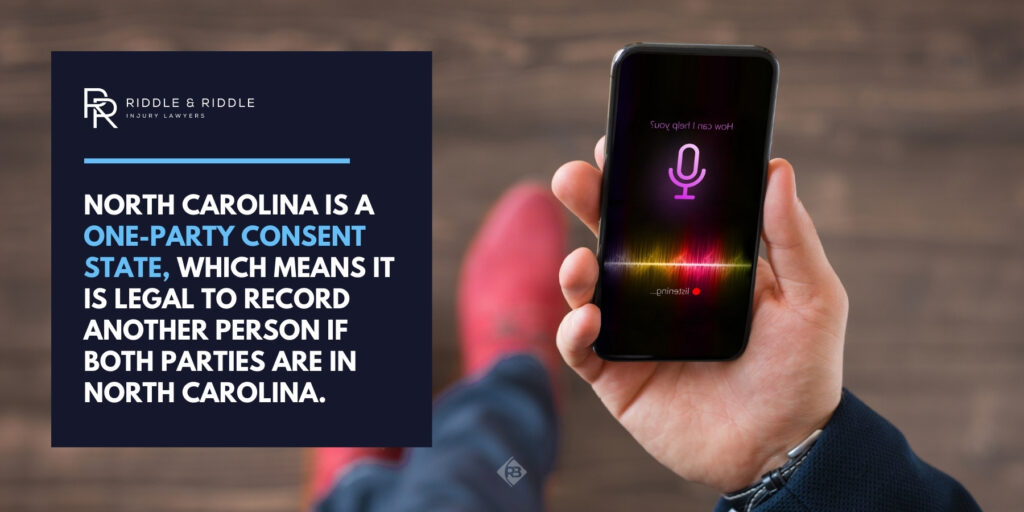Riddle & Riddle Injury Lawyers | March 26, 2019 | Personal Injury

It is not uncommon to see videos of porch thieves caught on doorbell cameras. Amazon’s Ring, Google’s Nest Hello, and other doorbell camera products are growing in popularity and make it easier than ever to catch these criminals. You don’t even have to be home to see who is at your door. Simply look at the app on your smartphone.
There are many companies that make doorbells that allow video and audio to be recorded when motion is detected near your front door. It’s easy to install security cameras to watch your home or check on pets while you are away, but privacy may be an overlooked issue.
PLEASE NOTE: We are providing this information to help answer common questions regarding this area of law, but we do not handle these types of cases.
Are Home Security Cameras Legal?
While doorbell camera technology may help you catch a thief, could it also result in you facing criminal charges?

When placing a doorbell camera, it is important not to focus solely on your neighbor’s property. This may imply you are not just using the camera for your own protection. When purchasing these cameras, you are agreeing to the company’s terms and services. You are expected to follow the laws based on where you live.
Doorbell camera laws in North Carolina
So where can you point the doorbell camera?
Remember, general privacy laws apply. Privacy laws state that people should have a reasonable expectation of privacy. You can’t aim the camera at a neighbor’s bedroom or bathroom, but public roads or places visible from the street are fair game.
And what about audio?
In North Carolina the North Carolina Electronic Surveillance Act is applicable. North Carolina is a one-party consent state, which means it is legal to record another person if both parties are in North Carolina.

The NC Electronic Surveillance Act states you cannot record audio without the consent of at least one person involved in the conversation. This means that if you speak to someone at your door through the app, it is fine to share that recording.
Privacy experts agree that as doorbell camera technology continues to advance, laws will probably change. It is important to stay up to date on the laws governing what is legal and what is an invasion of privacy when it comes to video and audio doorbell cameras. Remember, all state laws are different.
A way to avoid violation of privacy is to simply post visible signs near the cameras on your property warning people that the area is under video and audio surveillance. These warning signs must be clearly visible.
PLEASE NOTE: We are providing this information to help answer common questions regarding this area of law, but we do not handle these types of cases.
For more information, please contact Riddle & Riddle Injury Lawyers to schedule a free consultation with a personal injury lawyer in North Carolina today. We have twelve convenient locations in North Carolina, including Greenville, Raleigh, Goldsboro, Jacksonville, Kinston, Charlotte, Greensboro, Durham, Fayetteville, Wilmington, Winston-Salem & Garner.
Riddle & Riddle Injury Lawyers – Raleigh Office
4600 Marriott Dr STE 500, Raleigh, NC 27612
(919) 876-3020
Riddle & Riddle Injury Lawyers – Charlotte Office
1914 J N Pease Pl Suite 142, Charlotte, NC 28262
(704) 486-5824
Riddle & Riddle Injury Lawyers – Durham Office
100 E Parrish St STE 200, Durham, NC 27701
(919) 728-1770
Riddle & Riddle Injury Lawyers – Garner Office
500 Benson Rd Suite 111, Garner, NC 27529
(800) 525-7111
Riddle & Riddle Injury Lawyers – Greensboro Office
7B Corporate Center Ct Suite 15, Greensboro, NC 27408
(336) 516-9066
Riddle & Riddle Injury Lawyers – Greenville Office
300 E Arlington Blvd Suite 2A #110, Greenville, NC 27858
(252) 397-8620
Riddle & Riddle Injury Lawyers – Goldsboro Office
601 N Spence Ave, Goldsboro, NC 27534
(919) 778-9700
Riddle & Riddle Injury Lawyers – Jacksonville Office
3391 Henderson Dr, Jacksonville, NC 28546
(910) 455-5599
Riddle & Riddle Injury Lawyers – Kinston Office
807 N Queen St, Kinston, NC 28501
(252) 397-8624
Riddle & Riddle Injury Lawyers – Fayetteville Office
2517 Raeford Rd, Fayetteville, NC 28305
(910) 387-9186
Riddle & Riddle Injury Lawyers – Wilmington Office
1608 Queen St Suite 12, Wilmington, NC 28401
(910) 889-4064
Riddle & Riddle Injury Lawyers – Winston-Salem Office
102 W 3rd St, Ste 1007, Winston-Salem, NC 27101
(336) 516-9042
